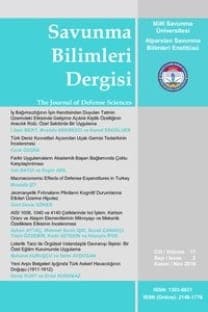Kara Kuvvetleri Havacılığında uçuş eğitim performansı belirleyicilerinin analizi
Uçuş görevinin kritik doğası gereği uçuş eğitimine katılacak personelin seçimi büyük önem taşımaktadır. Uçuş eğitimlerinin başarı ile tamamlanabilmesi üst düzeyde dikkat, yetenek ve zihinsel süreçlerin kullanımını gerekli kılmaktadır. Bu nedenle, hem maliyet hem de uçuş eğitiminin kritik özellikleri bakımından eğitime katılacak adayların etkili yollarla seçilmesi gerekir. Uçuş eğitim performansının belirleyicileri üzerine yapılan araştırmalar, genel zihinsel özelliklerin ve psiko-motor yeteneklerin pilot performansının temel yordayıcılan olduğunu göstermiştir. Bu çalışmanın amacı Kara Havacılık Okulunda uçuş eğitimine başlayacak adayların seçiminde kullanılan tek kriter olan psiko-motor yetenek ölçümünün ötesinde, adayların Kara harp Okulu mezuniyet not ortalamalarının ve İngilizce bilgi seviyelerinin uçuş eğitim performansına etkilerini incelemektir. Analizler sonucunda psiko-motor yetenek, Kara Harp Okulu mezuniyet not ortalaması ve İngilizce bilgi seviyesinin birbirlerinden bağımsız olarak uçuş eğitim performansını yordadığı görülmüştür. Bulgular geçmiş çalışmalar temelinde tartışılmıştır.
Selection of candidates for aviation training plays a critical role because of the special nature of pilot training and the critical tasks of pilots. Compared to other routine tasks, the success of flight training programs largely depends on the greater use of attention, ability, other cognitive processes. Hence, effective selection systems must be employed considering cost effectiveness of the programs and specific characteristics of flight training. Past research on the predictors of flight training performance has demonstrated that general cognitive and psychomotor abilities are the fundamental predictors of pilot performance. The purpose of study was to examine the predictive power of the Turkish Army Academy graduation grades English level in addition to psychomotor abilities in the selection of pilots in the class of Turkish Army Aviation. In conclusion, psychomotor abilities, Turkish Army Academy graduation grades, and English level were found to significantly and independently contribute to the prediction flight training performance. However, considering the critical limitations of the study, such range restriction on the variables and lack of data from the candidates who dropped out of the training program, a comprehensive selection model for pilot candidates was not proposed.
___
- 1.Ahuja, R.K., Kumar, A., Krishna, J. ve Orlin, J.B., 2003. Exact and Heuristic Methods for the Weapon Target Assignment Problem. MIT Sloan School of Management Working Paper, 4464-03: 1-20.
- 2.Anderson, D.R., Sweeney, D.J. ve Williams, T.A., 2000. An Introduction To Management Science: Quantitative Approaches To Decision Making, Ninth Edition, South-Westem College Publishing.
- 3.Braford, J.C., 1961. Determination of Optimal Assignment of a Weapon System to Several Targets. Vought Aeronautics, AEREITM-9.
- 4.Cullenbine, C.A., Gallagher, M.A. ve Moore, J.T., 2003. Assigning Nuclear Weapons with Reactive Tabu Search. Military Operations Research, 8 (1): 57-69.
- 5.Day, R.H., 1966. Allocating Weapons to Target Complexes by Means of Nonlinear Programming. Operations Research, 14: 992-1013.
- 6.Grant, K.E., 1993. Optimal Resource Allocation using Genetic Algorithms. Naval Review, Washington, DC: Naval Research Laboratory, pp. 174-175.
- 7.Frontline Systems, Inc.,http://www.solver.com/xlslssqpeng.htm, 15.11.2004.
- 8.Hosein, P. ve Athans, M., 1989. The Dynamic Weapon-Target Assignment Problem. 1989 Symposium on C2 Research, Washington, pp. 1-6.
- 9.Jaiswal, N.K., 1997. Military Operations Research: Quantitive Decision Making, Boston: Kluwer Academic Publishers.
- 10.Lee, Z.J. ve Lee, W.L., 2003. A Hybrid Search Algorithm of Ant Colony Optimization and Genetic Algorithm Applied to Weapon Target Assignment. Lecture Notes in Computer Science: Intelligent Data Engineering and Automated Learning, Springer-Verlag Heidelberg, Volume 2690: 278-285.
- 11.Lee, Z.J., Lee, C.Y. ve Su, S.F., 2002. An Immunity Based Ant Colony Optimization Algorithm for Solving Weapon-Target Assignment Problem. Applied Soft Computing, 2: 39-47.
- 12.Lee, S.M., Moore, L.J. ve Taylor III, B.W., 1990. Management Science. Third Edition, United States: Allyn and Bacon Publishing.
- 13.Lloyd, S.P. ve Witsenhausen, H.S., 1986. Weapons Allocation is NP-complete. Summer Conference on Simulation, Reno, NV.
- 14.Manne, A.S., 1958. A Target-Assignment Problem. Operations Research, 6:346-351.
- 15.Timor, M., 2001. Yöneylem Araştırması ve İşletmecilik Uygulamaları. İstanbul: İ.Ü. İşletme Fakültesi Yayını.
- 16.Tulunay, Y., 1991. Matematik Programlama ve İşletme Uygulamaları. 3.baskı, İstanbul: İ.Ü. İşletme Fakültesi Yayını.
- 17.Wacholder, E., 1989. A Neural Network-based Optimization Algorithm for the Static Weapon-target Assignment Problem. ORSA Journal on Computing, 4: 232-246,
- 18.Winston, W.L., 2004. Operations Research: .Applications and Algorithms. (4th Ed.), USA: Brooks/Cole -Thomson Learning.
- 19.Winston, W.L. ve Albright, S.C., 2001. Practical Management Science. 2nd Ed., USA: Duxbury Thomson Learning.
- ISSN: 1303-6831
- Yayın Aralığı: Yılda 2 Sayı
- Başlangıç: 2002
- Yayıncı: Milli Savunma Üniversitesi Alparslan Savunma Bilimleri ve Millî Güvenlik Enstitüsü
Sayıdaki Diğer Makaleler
Ali DURMUŞ, Eldar MUSAYEV, Sedat ÜLKÜ
Oğuzhan KIRILMAZ, İlknur ÖZMEN
KARA KUVVETLERİ HAVACILIĞINDA UÇUŞ EĞİTİM PERFORMANSI BELİRLEYİCİLERİNİN ANALİZİ
Murat KALE, Nebi SÜMER, H. Canan SÜMER
AN OWL ONTOLOGY FOR SHELL TRAJECTORIES
Ümit AVCI, Şevki KAYIR, Halit OĞUZTÜZÜN
BARIŞ GÜCÜ OPERASYONLARINDA TÜRKİYE-HOLLANDA BULUŞMASI
Joseph SOETERS, Erhan TANERCAN, Kadir VAROĞLU, Ünsal SIĞRI
ASKARAD’LARIN ARAZİ ÜZERİNDE YERLEŞTİRİLMESİNE YÖNELİK BİR KARAR DESTEK SİSTEMİ
AHP, BULANIK AHP VE BULANIK MANTIK’LA KARA HARP OKULUNA ÖĞRETİM ELEMANI SEÇİMİ
Kara Kuvvetleri Havacılığında uçuş eğitim performansı belirleyicilerinin analizi
